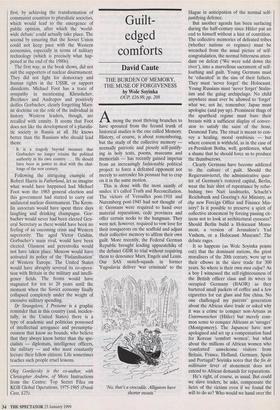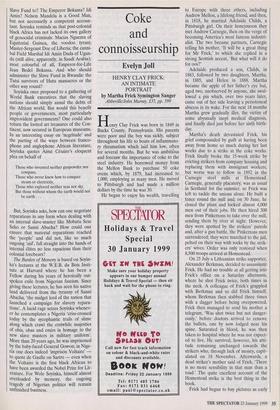Guilt-
edged comforts
David Caute
THE BURDEN OF MEMORY, THE MUSE OF FORGIVENESS by Wole Soyinka OUP, £16.99, pp. 208 Among the most thriving branches to have sprouted from the fecund trunk of historical studies is the one called Memory. History, of course, is about remembering, but the study of the collective memory normally patriotic and piously self-justify- ing in holy texts, poems, museums and memorials — has recently gained impetus from an increasingly fashionable political project: to force a defeated opponent not merely to surrender his pennant but to crap on it in the same motion.
This is done with the most saintly of smiles: it's called Truth and Reconciliation. The victors of Versailles post-1918 and Nuremberg post-1945 had not thought of it: Germans were required to hand over material reparations, cede provinces and offer certain necks to the hangman. They were not, however, required to vow love for their conquerors on the scaffold and adjust their collective memory to affirm their own guilt. More recently, the Federal German Republic brought leading apparatchiks of the defunct GDR to trial without requiring them to denounce Marx, Engels and Lenin. Our SAS snatch-squads in former Yugoslavia deliver 'war criminals' to the No, that's a crocodile. Alligators have shorter snouts.' Hague in anticipation of the normal self- justifying defence.
But another agenda has been surfacing during the half-century since Hitler put an end to himself without a hint of contrition. The collective memories of defeated tribes (whether nations or regimes) must be wrenched from the usual pieties of self- congratulation, the normal bitterness atten- dant on defeat ('We were sold down the river'), into a marvellous sacrament of self- loathing and guilt. Young Germans must be 'educated' in the sins of their fathers. They must 'never forget' the Holocaust. Young Russians must 'never forget' Stalin- ism and the gulag archipelago. No child anywhere must ever be allowed to 'forget' what we, not he, remember. Japan must apologise (and pay up). Prominent thugs of the apartheid regime must bare their breasts with a sufficient display of conver- sion to satisfy the saint of the hour, Desmond Tutu. The ritual is meant to con- vey a healing, moral symbiosis — but where consent is withheld, as in the case of ex-President Botha, well, gentlemen, what a shame that he should force us to produce the thumbscrews.
Clearly Germans have become addicted to the culture of guilt. Should the Regierunsviertel, the administrative quar- ter of Germany's restored capital, Berlin, wear the hair shirt of repentance by refur- bishing two Nazi landmarks, Schacht's Reichsbank and Goering's Air Ministry, as .the new Foreign Office and Finance Min- istry? Is it possible to preserve a spirit of collective atonement by forcing passing cit- izens not to look at architectural eyesores? Should Berlin build a Holocaust Monu- ment, a version of Jerusalem's Yad Vashem, or a Holocaust Museum? The debate rages.
It so happens (as Wole Soyinka points out) that the dominant nations, the great moralisers of the 20th century, were up to their elbows in the slave trade for 300 years. So where is their own mea culpa? As a boy I witnessed the self-righteousness of the British officer class and its wives in occupied Germany (BAOR) as they bartered small packets of coffee and a few cigarettes for cut glass and fine china. No one challenged my parents' generation about the African slave trade or asked why it was a crime to conquer non-Aryans as Untermenschen (Hitler) but merely com- mon sense to conquer Africans as 'savages' (Montgomery). The Japanese have now apologised and set up a compensation fund for Korean 'comfort women', but what about the millions of African women who `comforted' unwelcome visitors from Britain, France, Holland, Germany, Spain and Portugal? Soyinka notes that the fin de millenaire fever of atonement does not extend to African demands for reparations.
He's right, of course, as usual. But could we slave traders, he asks, compensate the heirs of the victims even if we found the will to do so? Who would we hand over the Slave Fund to? The Emperor Bokassa? Idi Amin? Nelson Mandela is a Good Man, but not necessarily a competent accoun- tant. Soyinka reminds us that post-colonial black Africa has not lacked its own gallery of genocidal criminals; Macias Nguema of Equitorial Guinea, the voodoo tyrant; Master-Sergeant Doe of Liberia; the canni- bal Field Marshal Idi Amin Dada of Ugan- da (still alive, apparently, in Saudi Arabia); most colourful of all, Emperor-for-Life Jean Bedel Bokassa. And who should administer the Slave Fund in Rwanda: the Tutsi survivors of Hutu massacres or the other way round?
Soyinka once proposed to a gathering of World Bank executives that the slaving nations should simply annul the debts of the African world. But would this benefit people or governments, most particularly improvident governments? One could also return the looted art treasures of the Con- tinent, now secured in European museums. In an interesting essay on 'negritude' and the parting of the ways between franco- phone and anglophone African literature, Soyinka quotes Aime Cesaire's eloquent plea on behalf of
Those who invented neither gunpowder nor compass, Those who never knew how to conquer steam or electricity, Those who explored neither seas nor sky, But those without whom the earth would not be earth ...
But, Soyinka asks, how can one negotiate reparations in any form when dealing with an internal slave-master like Mobutu Sese Seko or Sanni Abacha? How could one ensure that material reparations reached the 'people' and did not, like so much ongoing 'aid', fall straight into the hands of internal elites no less rapacious than their colonial forebears?
The Burden of Memory is based on Soyin- ka's lectures at the W.E.B. du Bois Insti- tute at Harvard where he has been a Fellow during his years of heroically out- spoken exile from Nigerian fascism. Since giving these lectures, he has seen his native land delivered from the tyranny of Sanni Abacha, 'the midget lord of the nation that launched a campaign for slavery repara- tions'. A lucid rage seizes Soyinka whenev- er he contemplates a Nigeria 'criss-crossed today by the sycophantic trails of slime along which crawl the erstwhile majesties of obis, obas and emirs in homage to the new slave masters in military uniform'. More than 20 years ago, he was imprisoned by the baby-faced General Gowon; in Nige- ria one does indeed 'imprison Voltaire' to quote de Gaulle on Sartre — even when the Voltaire is the first black African to have been awarded the Nobel Prize for Lit- erature. For Wole Soyinka, himself almost overloaded by memory, the ongoing tragedy of Nigerian politics will remain unfinished business.



























































 Previous page
Previous page